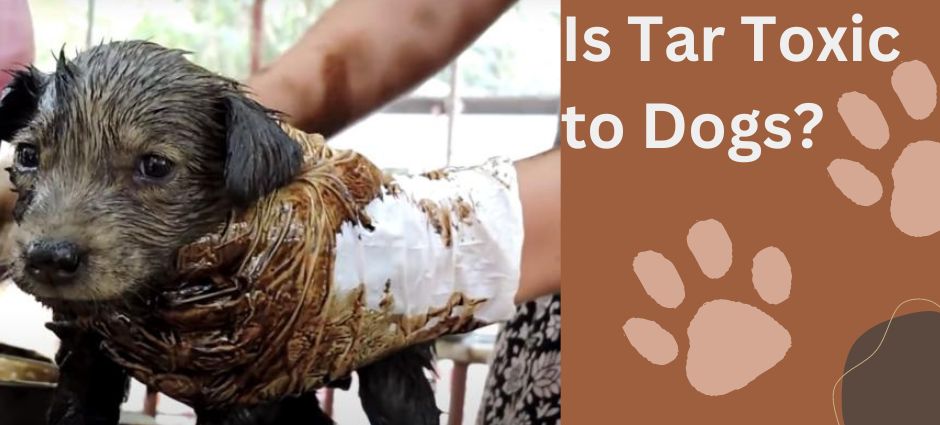Our furry companions are endlessly curious, and sometimes that curiosity leads them to explore things that might be harmful. Tar, a sticky black substance often found in roofing materials, driveways, and certain sealants, can be particularly tempting for stuffed dogs black and white to investigate. But the question remains: Is tar toxic to dogs?
The answer, unfortunately, is yes. Tar, specifically coal tar, contains a group of chemicals called polycyclic aromatic hydrocarbons (PAHs), which are toxic to both humans and animals. These PAHs can cause a range of health problems in dogs, depending on the amount ingested and the duration of exposure.
Let’s read a little more about it!
Is Tar Toxic to Dogs? How Can Pups Be Exposed to Tar?
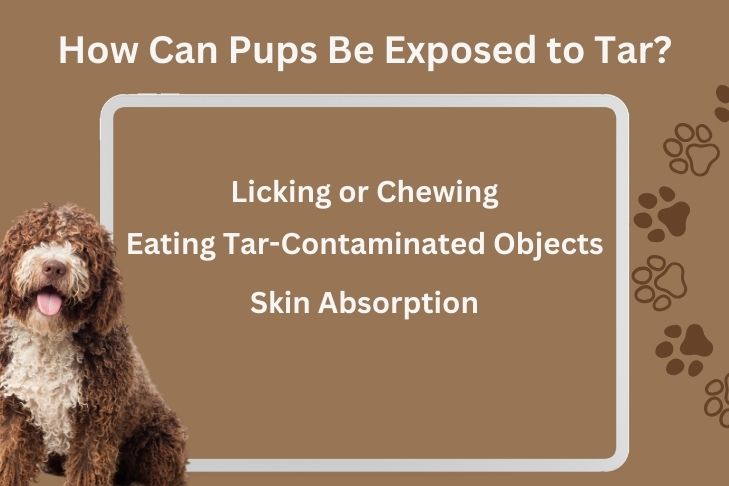
If you’re thinking about how dogs can be exposed to tar for it to be toxic for them, you have no idea about the lengths of creativity furry little pups go to, to do the most funny and stupid things that unfortunately also cause them harm at times.
- Licking or Chewing: This is the most common way, especially if tar is present on driveways, walkways, or roofing materials within reach.
- Eating Tar-Contaminated Objects: If your dog chews on sticks, toys, or bones that have come into contact with tar, they could ingest it.
- Skin Absorption: While less common, prolonged contact with tar on the fur can lead to some PAH absorption through the skin.
Note: Licking, eating, or chewing tar-contaminated objects can also cause dog mouth ulcers.
Signs of Tar Poisoning in Dogs
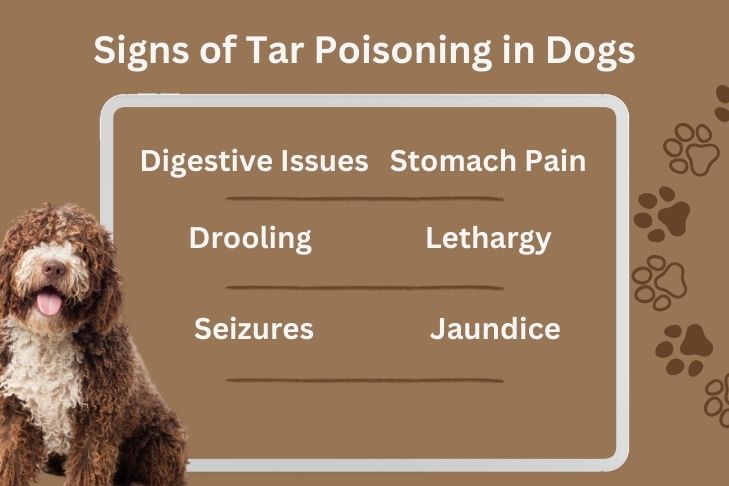
Are you stuck on this question: Is tar toxic to dogs? Worry not! Symptoms are here.
If you suspect your big white dog has ingested tar, be on the lookout for these signs:
- Digestive Issues: Vomiting, diarrhea, and loss of appetite are common symptoms.
- Stomach Pain: Whimpering, restlessness, and a hunched posture can indicate abdominal discomfort.
- Drooling: Excessive drooling might be a sign of irritation in the mouth and throat.
- Lethargy: Your chunky dog may appear tired and less interested in their usual activities.
- Seizures: In severe cases, tar poisoning can lead to seizures and neurological problems.
- Jaundice: Yellowing of the eyes and gums can indicate liver damage from PAH exposure.
If you notice any of these signs after your dog has been around tar or you suspect something wrong, make sure you get in touch with your vet as soon as possible so you can get your pup examined and treated before more harm comes his way.
Is Tar Toxic to Dogs’ Skin? What To Do?
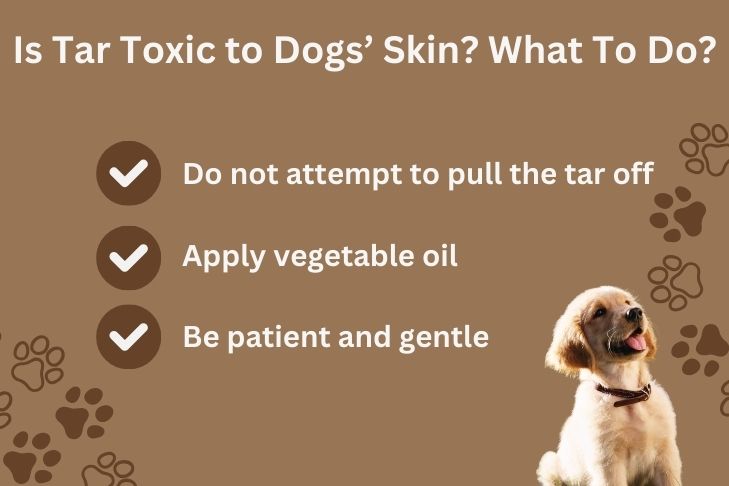
If you find tar on your dog’s fur, it’s important to remove it as quickly and safely as possible. Here’s a list of things you can instantly do to avoid poisoning your large furry dog.
- Do not attempt to pull the tar off. This can irritate the skin further.
- Apply vegetable oil. Gently massage the oil into the fur to loosen the tar’s grip.
- Wash with dish soap and warm water. Dawn dish soap is a popular choice for removing sticky substances from pets.
- Be patient and gentle. The removal process may take some time, especially for larger tar patches.
- Monitor your dog for signs of irritation. If your dog shows signs of discomfort, stop the cleaning and contact your veterinarian.
Remember, never use harsh chemicals or solvents to remove tar. These can be even more harmful to your dog’s skin than the tar itself.
Is Tar Toxic to Dogs and How to Prevent it?
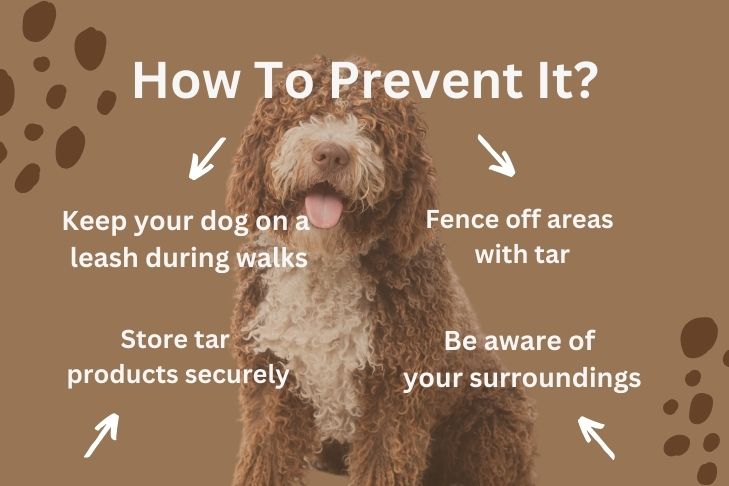
The best way to protect your dog from tar poisoning is to prevent them from coming into contact with tar in the first place. Here are some tips:
- Keep your dog on a leash during walks. This will help you control where they explore and prevent them from licking or ingesting anything harmful.
- Fence off areas with tar. If you have tar on your driveway or roof, make sure it’s in an area inaccessible to your dog.
- Store tar products securely. Keep any tar-based sealants, paints, or roofing materials out of reach of your dog.
- Be aware of your surroundings. If you’re visiting a new place, be mindful of potential tar hazards and keep your dog close.
Do you know there are a few diseases that can cause allergies and dark itchy spots on dogs skin? Make sure to avoid them. By being vigilant and taking preventative measures, you can help keep your furry friend safe from the dangers of tar poisoning.
Living with a Dog Who Likes to Chew?

Some puppies are more prone to chewing than others. If your dog has a strong chewing habit, providing them with plenty of safe and stimulating chew toys can help redirect their attention away from potentially harmful objects like tar.
Additionally, training your big furry dog with positive reinforcement techniques can teach them what is and is not acceptable to chew on.
Conclusion
Tar can be a serious health hazard for dogs. By understanding the risks, recognizing the signs of poisoning, and taking steps to prevent exposure, you can help keep your canine companion safe and healthy.
We hope we answered your question “Is Tar Toxic to Dogs?” and hope your doggo remains safe!



